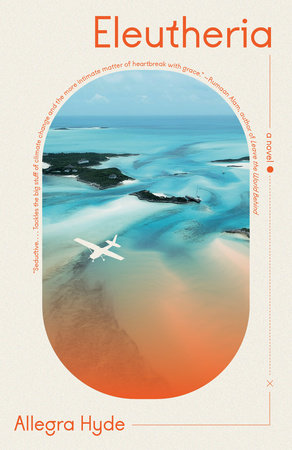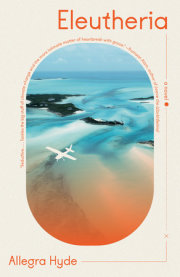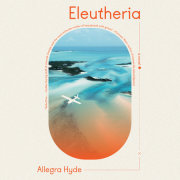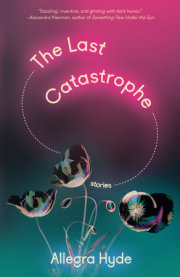1
My name, my full name, is Willa Marks. There’s nothing in the middle. My parents must have had their reasons for the omission, though I’ve always considered it a sign of honesty. A middle name can lurk in a person like a bomb: a secret identity poised to pop off. I’m simply me.
What I’m trying to say is that I’m going to tell you the truth. I don’t have time to tell you anything else. And it’s important for you to hear the truth because what has been said about Camp Hope, about me, is a shadow of what really happened.
Let me start with the easy parts.
I was twenty-two when I boarded a plane and flew to Eleutheria.
I was drunk on ideas.
I was so drunk, in fact, that when the turboprop shuddered into a nosedive—cabin lights flickering, pilot crackling over the intercom—my limbs remained limp. While the other passengers hunched in their seats, prayers on their lips, I kept my eyes open, savoring the rush of arrival, the jarring smack of it reverberating through me.
The turboprop did not land elegantly, but it landed intact. Even so, had the plane crashed onto the island, I’d still have walked out of the wreckage, beatific. I’d been awake the length of a day, a night, and that had not yet become a problem. I was the kind of person who took exhaustion in stride, let it warp my surroundings into dreamscapes. And so far, everything had gone right.
Out the airplane window: palm trees, a heat-seared tarmac, men in orange vests strolling from the steel maw of a rusted aircraft hangar. Around me, a dozen other passengers unbuckled their seat belts. Some smiled relievedly, others wiped away tears. A woman’s purse had spilled into the aisle and I helped her collect her things, though I curbed my impulse to ask if she was from Eleutheria. To get caught in conversation might break whatever spell had whisked me from Boston to the Bahamas, a spell meant to carry me on to Camp Hope. I wanted to arrive unimpeded, unburdened, slick as a fish released into the sea. If I could have, I would have traveled to the island naked. As it was, my backpack contained only a change of clothes, a passport, sixty-five U.S. dollars, and my well-thumbed copy of Living the Solution: The Official Camp Hope Guide to Transforming Ourselves and Saving the Planet.
I had the envelope as well—the one from Sylvia—but I tried not to think about it.
What I thought about was Camp Hope. Specifically, about arriving at Camp Hope and making my life mean something. Had you watched me exit the airplane, my preoccupation would have been obvious. You would have seen a young woman who tripped over her own boots—a size too large—as she entered the hangar. You might have noticed one of my overall cuffs was rolled up higher than the other, that my backpack zipper gaped partially open. Back in Boston, I would have been a person your eyes glazed over on the street: shiftless, among the masses of the newly unemployed. I had an oval face, brittle yellow hair that went dark at the roots, a stub of a nose. I was thin, but not jagged. Scrappy, though in an untested way: like a runaway who has only just left the house, or an actor playing a role. Familiar enough to forget.
In the echoing dimensions of the hangar, however, I stood out. I’d traveled to the island alone and there was no one there to meet me. I had little luggage. I was white and the only person queued in the International Arrivals line. A weary customs agent took my passport, studied it, shrugged. There were no biometric scanners here. Not in this makeshift terminal, arrivals separated from departures by a plastic partition. The original building, like so much else on the island, had been ravaged by hurricanes. Under different circumstances, I might have been made teary-eyed by the scene of my fellow passengers embracing loved ones, opening luggage to reveal supplies from elsewhere—bags of dried rice, baby clothes, phone chargers—but I fixed my attention on the airport exit: a square of sunshine on the far side of the hangar.
I have what you could call a tendency toward fixation. This tendency has been described as childish by some. People have told me, in general, that I have a childlike demeanor. My short stature is partly to blame. Also, my smattering of freckles—though these would multiply, day by day, colonizing my complexion the longer I remained on Eleutheria. I did not have any muscle tone, though that would change as well. I had little coordination. I have only ever been graceful in photos. Pinned under someone else’s gaze, I look best in stillness.
I was not still. Walking with rollicking, over-long strides, I burst out of the hangar into dazzling sunshine. A parking lot shimmered, woozy with heat, its perimeter rimmed by a chain-link fence. In the distance, a narrow highway disappeared into a low swath of scrubland.
My skin burned hot; I had Living the Solution churning inside me and with it the heat of my own ambition. I tended to flush in odd ways—in my fingertips, mostly—though if you’d been watching, this would have been invisible. You would have seen only a pale girl striking out across a parking lot. A lost girl, harmless—or even in harm’s way—easily manipulated. A rube. It was true, my official education extended only through high school, homeschooled at that. But I was not entirely inexperienced. At twenty-two, I’d had my own unusual education. I considered myself intellectually advanced in one significant way: I was too wise for cynicism. I had outsmarted doubt.
No one at Camp Hope knew I was coming. No one would know who I was when I arrived. I maintained, nevertheless, a propulsive confidence. Reaching the edge of the parking lot, I started down the side of the highway, soaking in sunshine, electrifying my body, intending only to move closer to my destination—a place in my head, rather than direct view—so that, if you’d been watching, you might have seen my eyes go unfocused, my chin lift, my chest tugged forward by an invisible string.
Someone was watching. A pickup truck trailed me out of the parking lot and onto the highway. There were four men in the truck: two in the front and two in the back. The pair in the back wore sun-faded T-shirts that billowed in the breeze, their arms stretched along the edges of the truck bed. The man in the passenger seat wore an orange vest, as if he’d just stepped off the airport tarmac. The driver was obscured.
I kept walking and the truck kept rolling, until the man in the orange vest called: You a surfer? Or—
A fugitive? interrupted a man in the back.
There was laughter, but I didn’t care—I didn’t even break stride. In my mind’s eye, my destination glittered: an ecoparadise, a pragmatic arcadia, an answer to the problem that had haunted me my whole life.
Are you lost? said the man in the orange vest.
Though I’d barely spoken for a day and a half, my answer burst forth, bell-like and bright: I’m going to Camp Hope.
The truck stopped rolling. The men’s laughter ceased. I continued on, unperturbed, reciting lines from Living the Solution beneath my breath, swinging my arms as I walked the ragged edge of the highway.
Ten minutes later, the truck again rumbled alongside me. All the men had gotten out except the driver. He leaned across the passenger seat, his face visible for the first time. He was handsome in a plaintive way, his eyes half-closed, his jawline shadowed by a beard, his dreadlocks pulled behind his head. He asked if I was really going to Camp Hope.
Sure am, I said.
Camp Hope is far, far from here, he said.
I can manage, I said—though in truth it was hotter than seemed possible for the month of May. Only squat palms and brambly foliage stretched before me, with no sign of a settlement or even the sea, save for the wheeling arc of a gull overhead.
Also, said the driver, you’re walking the wrong way.
He told me to let him give me a ride. He said he didn’t mind, speaking in a tenor of nonchalance I should have perhaps recognized as forced. He was, in fact, keenly interested in what I had to say and where I was going. Deron was his name. For a long time I was angry at him, given what would happen later on, though my feelings have since changed. I hope Deron is well and happy wherever he is now, even if—in his own way and for his own reasons—he did make everything more complicated.
The truck roared down the highway, wind slicing into the cabin through the open windows. I might have remained quiet, watched the landscape blur past, convinced an invisible current was carrying me closer to Camp Hope—but of course, that was not what was happening. That was not happening at all.
The truck cabin was cramped and Deron was tall, yet he maintained a casual posture, except where his hand clenched the stick shift. The grip meant little to me; I hadn’t spent much time in trucks and didn’t know anything about driving them. What I noticed was that Deron had used an elastic tie with pink plastic beads—the kind little girls wear—to gather his hair. This made me like him. When he asked my name, I told him.
I’m Willa, I said. Willa Marks.
Out the windows: scrubland sprawled in every direction, except for a tumbledown gas station, plywood fixed over one window like a pirate eye patch. Further on, a worn sign indicated an upcoming settlement.
Willa Marks, said Deron, you don’t look like the Camp Hope type.
I’m exactly the type, I said.
Deron nodded with exaggerated slowness. The truck rumbled into a small community comprised of cinder-block homes painted pastel pinks, yellows, teals with white trim. A group of men watched the truck pass from the shade of a garage. A lone woman, scowling, sat beside a spread of cucumbers, tomatoes, and papayas. Farther on, a pair of children dangled from a swing set. Chickens skittered into the brush.
Deron repeated my name to himself, as if trying to remember where we had met, and for the first time on my journey, I felt uneasy. I did not like hearing my name said aloud, chanted like a password to a history I’d forgotten.
Willa, Willa, Willa. What does that mean—Willaaaa?
I shrugged. My mother once told me she named me Willa because there was a willow in her front yard growing up: a tree everyone thinks of as peaceful, with its long droopy branches, thin leaves. Really, it’s a ferocious tree, with roots spreading underground, fingering the foundations of houses, bubbling up the asphalt of driveways. I never quite believed my mother, though. If she had admired the tree so much, why hadn’t she named me Willow? Now she was too dead to ask.
Why don’t I look like the Camp Hope type? I said.
A smile hitched one side of Deron’s mouth. As if he hadn’t heard my question, he said he had an interest in names. He asked if I knew the meaning of the island’s name—Eleutheria— his accent smoothing off vowels at the beginning and the end of the word, the way ocean water smooths down glass, making me feel a little seasick, storm-tossed too. He started talking about the island’s history. There’d been a shipwreck, religious colonists. My attention drifted. Out the truck window, confectionary-colored houses gave way to abandoned buildings, vines snaking their walls. Beyond them lay piles of twisted metal, roofs displaced from their frames. A rowboat’s rotting stern crested a wave of fruit pods in the branches of a tamarind tree. This part of the island had been hard-hit by hurricanes.
Copyright © 2022 by Allegra Hyde. All rights reserved. No part of this excerpt may be reproduced or reprinted without permission in writing from the publisher.







